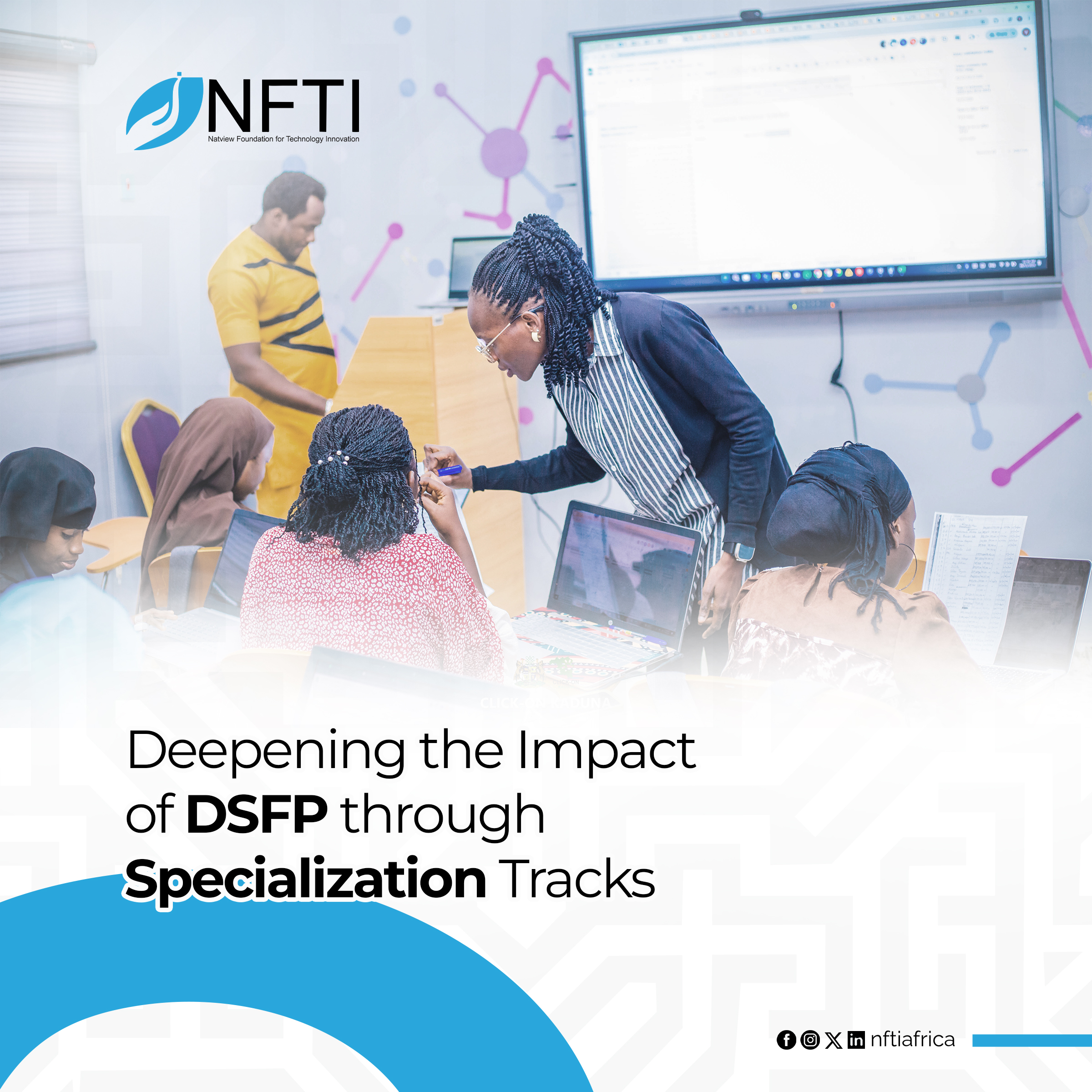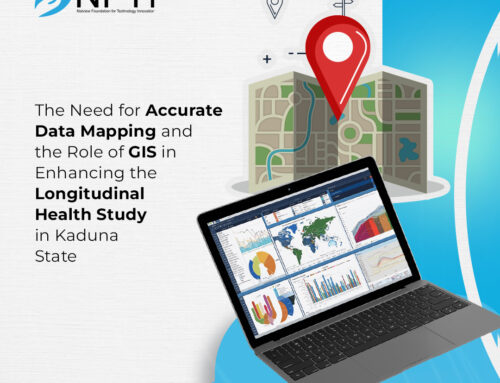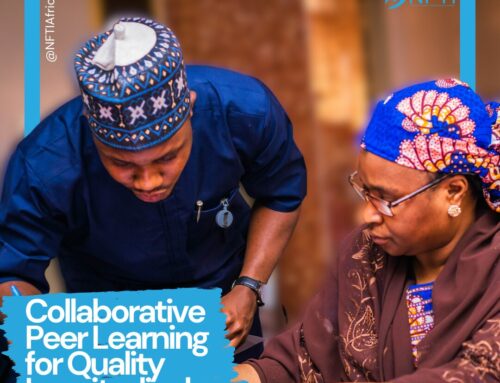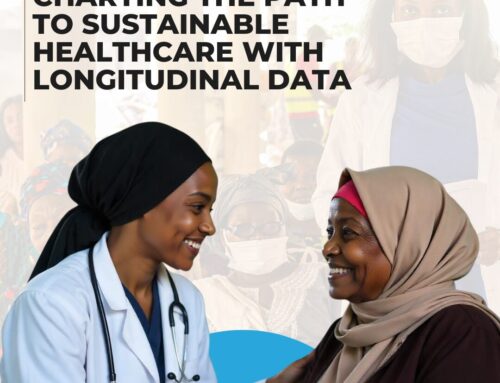For years, NFTI has been at the forefront of initiatives that equip young people with the skills, tools, and platforms they need to drive meaningful change in their communities. Our mission to ignite a data revolution for sustainable development across Africa has manifested in real, measurable impact, particularly through the Click-On Kaduna Data Science Fellowship Programme (DSFP). Over the last four years, the program has achieved remarkable results, training 150 fellows, many of whom are now thriving in state, national, and international roles. However, we have never considered the success of DSFP as a milestone; rather, it has served as a foundation for ongoing enhancement.
Artificial Intelligence has taken center stage in global conversations, signaling a worldwide race to harness its power for innovation, efficiency, and impact. Nations are investing billions, industries are being reshaped, and the demand for talent that can build, understand, and ethically deploy AI solutions has never been higher. The seismic shift in AI advancement isn’t just happening in industry; governments are investing, policymakers are adapting, and entire education systems are evolving to meet the demands of a rapidly transforming workforce. Kaduna State is no exception.
Implemented by the Natview Foundation for Technology Innovation (NFTI) in partnership with the Kaduna State Bureau of Statistics and funded by the Bill & Melinda Gates Foundation, the DSFP has consistently strived to stay at the forefront of innovation. The fellowship program was created to bridge the data capacity gap in Kaduna State by equipping young professionals and civil servants with the skills to drive evidence-based policymaking and efficient public service delivery.
But the world has changed significantly since the first cohort walked through the doors of the Kaduna SDGs Data Lab, the home of the Kaduna State Bureau of Statistics and the place where the paid fellowship is hosted. The global demand for data scientists has exploded. Nigeria’s tech ecosystem has continued to evolve. The rise of AI and advanced analytics has transformed data science from a generalist skillset into a complex, highly specialized field. Therefore, DSFP needed to undergo its own evolution.
In its first three iterations, the DSFP focused on building strong foundational knowledge in data science. Fellows were introduced to Python programming, advanced Excel analytics, Power BI, SQL, and the principles of data collection, cleaning, and visualization. This foundational curriculum served its purpose: it gave 110 fellows from DSFP 1.0 to 3.0 the tools to enter the workforce, contribute to government projects, and, in some cases, transition to careers in top global organizations.
However, as technology advanced and the global conversation around AI intensified, the implementation team began to ask, “What more can we do?”
The answer came through thoughtful reflection and industry consultation. The consensus was clear: while foundational training was valuable, fellows needed to dive deeper into specialized areas to remain competitive. They must not only utilize data but also take the lead in its application. That insight sparked one of the most significant innovations in the program, introducing specialization tracks in DSFP 4.0.
To remain relevant and globally competitive, DSFP 4.0 introduced three carefully curated specialization tracks: Artificial Intelligence & Machine Learning, Data Engineering, and Geographic Information Systems (GIS). Each track was developed based on industry demand, global trends, and the long-term needs of the Kaduna State Government and Nigeria’s broader data ecosystem.
But why specialization? The answer lies in how the workforce is evolving. While foundational skills are necessary for entry, specialization distinguishes you in the workforce. Whether it’s deploying AI solutions for public service delivery, managing high-volume data pipelines across MDAs, or using GIS for environmental and spatial analysis, the workforce needs professionals who can master specific components of data science. DSFP 4.0 excelled in this area.
Fellows in the Artificial Intelligence and Machine Learning track took their learning far beyond theory. One standout capstone project was the development of “NIFTY,” an AI-powered chatbot built specifically for Click-On Kaduna DSFP. The project showcased their mastery in Natural Language Processing (NLP) for chatbot interaction, Machine Learning for intelligent response generation, and effective team collaboration to bring the solution to life. NIFTY was proof that fellows could design tools tailored to real operational needs within their ecosystem.
A fellow in the same track developed an AI-powered model for predicting air quality, offering data-driven insights into environmental health. Using advanced techniques like Exploratory Data Analysis (EDA), feature engineering, and Random Forest Classifiers, the model achieved an impressive 99.98% accuracy rate. Packaged into a Streamlit application, the solution offers real-time assessments of SO₂, NO₂, RSPM, and SPM pollution levels. Such solutions can help industries monitor pollution and make the air safer for communities. Additionally, these solutions can support public health officials with early warnings and climate researchers with actionable data. This is the kind of innovation Nigeria needs: tech solutions grounded in context, developed by local talent, and driven by real data.
Why specialization? The answer lies in how the workforce is evolving. While foundational skills are necessary for entry, specialization distinguishes you in the workforce.
Meanwhile, the Data Engineering track focused on building scalable, secure, and automated data pipelines, skills that are critical in a world dominated by big data. One of the major projects developed by fellows in this track was a multi-source data pipeline built on Microsoft Azure. The solution ingests, processes, and visualizes data from four unique sources to support key insights for decision-makers.
This capability is especially important to government systems, where multiple departments and agencies need to integrate their data systems for greater efficiency. Through this specialization, fellows were equipped with the technical expertise to design cloud-based infrastructure and optimize the movement and transformation of data.
The Geographic Information Systems (GIS) track introduced fellows to spatial data analytics, allowing them to map, model, and monitor physical and environmental patterns. The track offered tools with real-world applications. For instance, Umar Balarabe, a fellow with a background in geography and climate change research, found a perfect fit in GIS. With mentorship from our seasoned instructors, Umar and his peers, who selected the GIS track, explored the powerful applications of spatial analysis in environmental monitoring and urban planning. The cohort engaged with tools like SW Maps, learning how to build interactive maps and analyze geospatial patterns that affect daily life in Kaduna. Umar characterized his experience as “nothing short of amazing,” highlighting how the program honed his analytical abilities and broadened his understanding of how data can effectively address practical issues.
The outcomes are self-evident. Beyond technical training, fellows developed capstone projects that were functional, contextually relevant, and impactful. These projects will be shared with various stakeholders, including policymakers and development partners, who are eager to support data-driven solutions at scale.
This success is the result of intentional design, excellent instruction, and a curriculum that evolves with the demands of the industry. The newly introduced specialization tracks have fundamentally redefined the learning journey of fellows of this prestigious program, empowered them to explore areas they’re passionate about, and ensured that Kaduna State and Nigeria at large have a pipeline of experts ready to drive change through data.
We’re not stopping here. The implementation team is already mapping out innovations for DSFP 5.0. There are plans to refine the specialization model, introduce new tracks aligned with global demand, and further integrate fellows into cross-sector projects with immediate impact. We’re also investing in better technology infrastructure, stronger mentorship pipelines, and a more robust alumni network that will support professional development and lifelong learning. The goal is to shape leaders who can design solutions, influence policy, and inspire innovation. The kind of leaders who not only anticipate change but also actively participate in it.
The specialization track of DSFP 4.0 has proven that young people can achieve extraordinary things with the right structure, mentorship, and vision. As the fourth cohort concludes their journey, we celebrate what they’ve learned and built over time. Here’s to the pioneers of specialization in DSFP and to the many more who will follow in their footsteps. Through these successes, the fellowship program has become Kaduna State’s premier innovation in human capital development while also presenting an adaptable blueprint for advancing youth empowerment and AI readiness across Africa.
To learn more about the program’s impact or explore opportunities for the next cohort, DSFP 5.0, visit www.natviewfoundation.org and follow us across our social media platforms.





